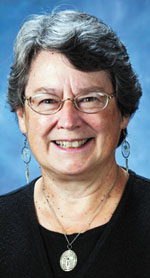By Corinne Winter

St. Athanasius, writing on the Incarnation, said, “God became man that we might become gods according to grace.” Often, in our celebration of Christmas, we seem to concentrate on God’s “coming down,” on the self-emptying that is demonstrated when God enters into human form. Athanasius calls us to celebrate as well the “raising up” of humanity. In Christ, we are called to share in the very life of God. That is the destiny God sets for us in Christ by the power of the Holy Spirit.
This past weekend, in the graduate course on sin and grace, we experienced a number of times the strength of the temptation to concentrate on the negative actions and non-actions of humanity to the point of being overwhelmed by them. We are bombarded by news of violence, injustice, and other human failures that are so much in contrast with what we believe we ought to be. Understandably, even justifiably, we experience disappointment, anger and frustration. We may even think it would be a good idea to establish relationships with a few who seem to be among the elite or chosen, who demonstrate a faith commitment and strong moral principles, and to write off most of the rest of humanity as being ineluctably on the way to Gehenna.
But by entering into our lives in a world that was no less marked by sin than it is today, God lets us know that we can’t do that. We share in God’s own life not in isolation from but precisely in relationship with the rest of the world. That relationship is, of course, not simply a “warm fuzzy” one limited to shared cups of hot chocolate. Any worthwhile relationship, as we all know from experience, includes mutual challenge as well as mutual support. Entering into the life of the world does not mean approving or letting slide the things we recognize as sinful. Indeed, the more we love, the more we want to see others be the best they can be. And so we will continue to experience disappointment and anger, and we will express those. We will do that with love because we will insist on seeing the potential for goodness – for sharing in God’s own life.
We will also not give up on ourselves as instruments of God’s grace. Again, in the light of all the issues that need to be addressed, we can be tempted to shrug our shoulders, “What can one person do?” And we do need to avoid the temptation to try to accomplish so much that we burn out. In fact, a number of theologians have described the effect of original sin as a tendency on our part to feel guilty for not being God, for not being able to transform ourselves and the world by our own efforts. At the same time, we must avoid the temptation to be paralyzed by guilt or despair. Rather, we must cultivate the virtue of hope in the power of the Holy Spirit at work within us and among us.
Especially as we gather to celebrate Eucharist, we should be renewed in faith, hope and love. There too, as Catholics, perhaps we can resist a temptation to think judgmentally about some who seem to join in the liturgy only at Christmas. Can we rejoice instead that their presence demonstrates that some sense of connection with us still draws them? Can we make a special effort to participate fully in the prayer so that the work of the Spirit within the community increases its attraction for all?
Christmas can be a season of joy, excitement, sadness, disappointment: it can include the full range of human emotions. Whatever it includes for each of us this year, may it call us to place our hope more fully in God born and at work within and among us in all the ordinariness, the messiness, and the strength of our everyday lives.
(Corinne Winter is a professor of theology at St. Ambrose University in Davenport.)







